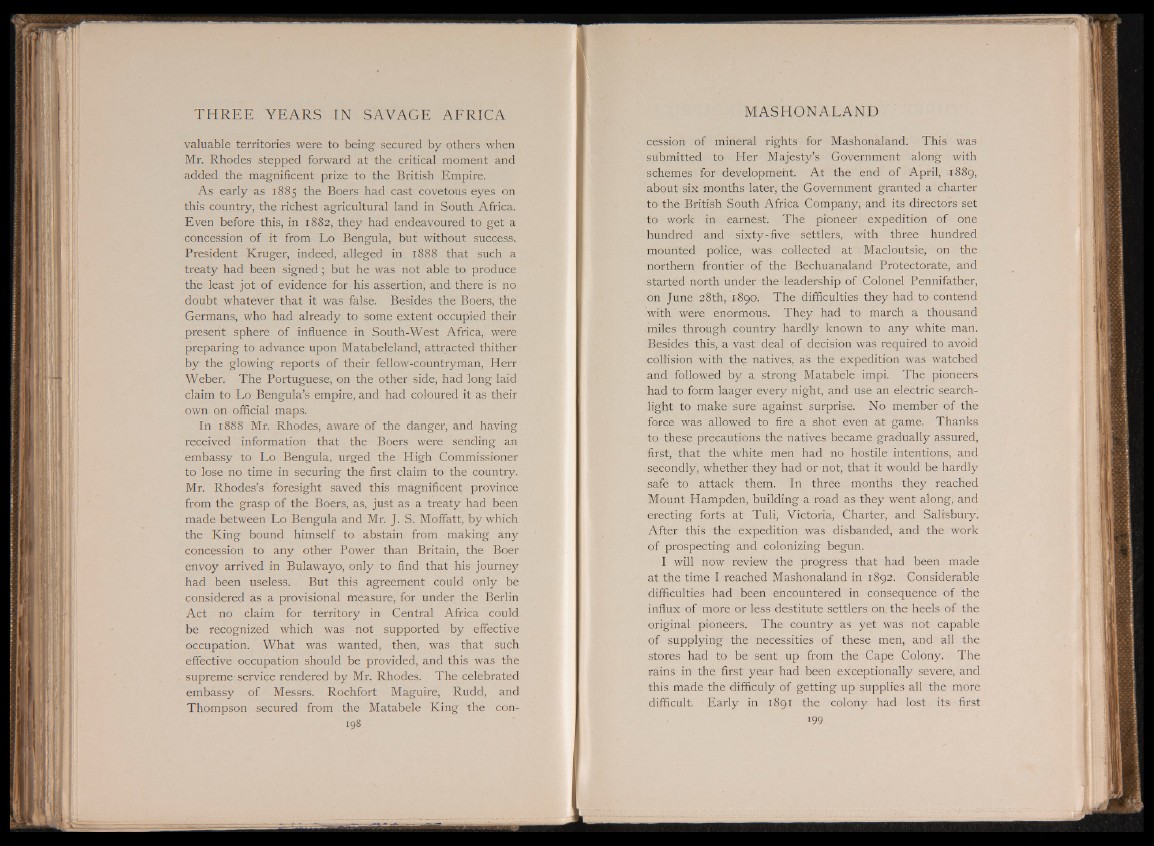
valuable territories were to being secured by others when
Mr. Rhodes stepped forward at the critical moment and
added the magnificent prize to the British Empire.
As early as 1885 the Boers had cast covetous eyes on
this country, the richest agricultural land in South Africa.
Even before this, in 1882, they had endeavoured to get a
concession of it from Lo Bengula, but without success.
President Kruger, indeed, alleged in 1888 that such a
treaty had been signed; but he was not able to produce
the least jot of evidence for his assertion, and there is no
doubt whatever that it was false. Besides the Boers, the
Germans, who had already to some extent occupied their
present sphere of influence in South-West Africa, were
preparing to advance upon Matabeleland, attracted thither
by the glowing reports of their fellow-countryman, Herr
Weber. The Portuguese, on the other side, had long laid
claim to Lo Bengula’s empire, and had coloured it as their
own on official maps.
In 1888 Mr. Rhodes, aware of the danger, and having
received information that the Boers were sending an
embassy to Lo Bengula, urged the High Commissioner
to lose no time in securing the first claim to the country.
Mr. Rhodes’s foresight saved this magnificent province
from the grasp of the Boers, as, just as a treaty had been
made between Lo Bengula and Mr. J. S. Moffatt, by which
the King bound himself to abstain from making any
concession to any other Power than Britain, the Boer
envoy arrived in Bulawayo, only to find that his journey
had been useless. But this agreement could only be
considered as a provisional measure, for under the Berlin
Act no claim for territory in Central Africa could
be recognized which was not supported by effective
occupation. What was wanted, then, was that such
effective occupation should be provided, and this was the
supreme service rendered by Mr. Rhodes. The celebrated
embassy of Messrs. Rochfort Maguire, Rudd, and
Thompson secured from the Matabele King the concession
of mineral rights for Mashonaland. This was
submitted to I Her Majesty’s Government along with
schemes for development. At the end of April, -1889,
about six months later, the Government granted a charter
to the British South Africa Company, and its directors set
to work in earnest. The pioneer expedition of one
hundred and sixty-five settlers, with three hundred
mounted police, was collected at Macloutsie, on the
northern frontier of the Bechuanaland Protectorate, and
started north under the leadership of Colonel Pennifather,
on June 28th, 1890. The difficulties they had to contend
•with were enormous. They had to march a thousand
• miles through country hardly known to any white man.
Besides this, a vast deal of decision was required to avoid
collision with the natives, as the expedition was watched
and followed by a strong Matabele impi. The pioneers
had to form laager every night, and use an electric searchlight
to make sure against surprise. No member of the
force was allowed to fire a shot even at game. Thanks
to these precautions the natives became gradually assured,
first, that the white men had no hostile intentions, and
■ secondly, whether they had or not, that it would be hardly
safe to attack them. In three months they reached
Mount Hampden, building a road as they went along, and
erecting forts at Tuli, Victoria, Charter, and Salisbury.
After this the expedition was disbanded, and the work
of prospecting and colonizing begun.
I will now review the progress that had been made
at the time I reached Mashonaland in 1892. Considerable
difficulties had been encountered in consequence of the
influx of more or less destitute settlers on, the heels of the
original pioneers. The country as yet was not capable
of supplying the necessities of these men, and all the
stores had to be sent up from the Cape Colony. The
rains in the first year had been exceptionally severe, and
this made the difificuly of getting Up supplies all the more
difficult. Early in 1891 the colony had lost its first
199